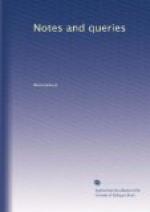J.S.
Snow of Chicksand Priory.—“A.J.S.P.” desires information respecting the immediate descendants of R. Snow, Esq., to whom the site of {352} Chicksand Priory, Bedfordshire, was granted, 1539: it was alienated by his family, about 1600, to Sir John Osborn, Knt., whose descendants now possess it. In Berry’s Pedigrees of Surrey Families, p. 83., I find an Edward Snowe of Chicksand mentioned as having married Emma, second daughter of William Byne, Esq., of Wakehurst, Sussex. What was his relationship to R. Snow, mentioned above? The arms of this family are, Per fesse nebulee azure, and argent three antelopes’ heads, erased counterchanged, armed or.
The Bristol Riots.—“J.B.M.” asks our Bristol readers what compilation may be relied on as an accurate description of the Bristol riots of 1831? and whether The Bristol Riots, their Causes, Progress, and Consequences, by a Citizen, is generally received as an accurate account?
1, Union Place, Lisson Grove.
A Living Dog better that a Dead Lion.—Can any of your readers inform me with whom the proverb originated: “A living dog is better than a dead lion?” F. Domin. Bannez (or Bannes), in his defence of Cardinal Cajetan, after his death, against the attacks of Cardinal Catharinus and Melchior Canus (Comment. in prim. par. S. Thom. p. 450. ed. Duaci, 1614), says—
“Certe potest dici de
istis, quod de Graecis insultantibus
Hectori jam mortuo dixit Homerus,
quod leoni mortuo etiam
lepores insultant.”
Query? Is this, or any like expression, to be found in Homer? If so, I should feel much obliged to any of your correspondents who would favour me with the reference.
JOHN SANSOM.
Author of “Literary Leisure.”—Can any of your readers inform me of the name of the author of Literary Leisure, published by Miller, Old Bond Street, 1802, in 2 volumes? It purports to have come out in weekly parts, of which the first is dated Sept. 26. 1799. It contains many interesting papers in prose and verse: it is dedicated to the Editors of the Monthly Review. The motto in the title-page is—
“Saiva res est: philosophatur
quoque jam;
Quod erat ei nomen? Thesaurochrysonicochrysides.”—Plautus.
Is the work noticed in the Monthly Review, about that time?
NEMO.
The Meaning of “Complexion."—Is the word “complexion,” used in describing an individual, to be considered as applied to the tint of the skin only, or to the colour of the hair and eyes? Can a person, having dark eyes and hair, but with a clear white skin, be said to be fair?
NEMO.
American Bittern—Derivation of “Calamity."—It has been stated of an American Bittern, that it has the power of admitting rays of light from its breast, by which fish are attracted within its reach. Can any one inform me as to the fact, or refer me to any ornithological work in which I can find it?




